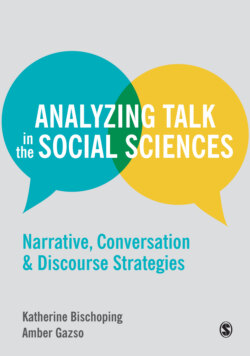Читать книгу Analyzing Talk in the Social Sciences - Katherine Bischoping - Страница 36
На сайте Литреса книга снята с продажи.
Textbox 3.6: Translating Talk of Self-love and ‘Jihad’
ОглавлениеWhen I was working in sales at Lucky Brand Jeans, one of my colleagues had a fascination with language. ‘Teach me something in Arabic,’ he’d say, ‘and I’ll teach you something in Portuguese.’
After a while of this, he asked me for help with a tattoo he wanted to get. He was going through a process of self-discovery and had found a perfect Buddhist saying to express it: ‘You, yourself, as much as anybody in the entire universe, deserve your love and affection.’
At the same time, he wanted a tattoo that would have an element of mystique, and that would express the saying in a way both visible and private. So, he asked me to translate it to Arabic. In one way I could do it. I could produce a word-for-word faithful translation.
But, I had to say to this colleague, this doesn’t convey the same meaning. To talk of self-love is not a dominant discourse in Arabic-speaking countries as I’ve experienced them. To speak in that way would convey a level of narcissism and individualism that would not pay heed to the collective. The expectation in these countries is that love and affection comes from those around us, not from ourselves. A faithful translation of this phrase could not be a transparent one.
A different challenge comes from the Arabic word jihad, which has entered the English vocabulary. Reading and writing ‘jihad’ in the West, many take for granted what it transparently means: a holy war. However, among Arabic speakers, the essence of jihad is struggle. Among us, it is a word that can be used in many contexts – for example, without any exaggeration at all, I could say to a friend, ‘I jihaded to write my essay!’
Thus, ‘jihad’ may seem transparent, but its use is unfaithful. What Samuel P. Huntington (1993) has called the Clash of Civilizations, the theory that post-Cold War conflict will be driven by religious and cultural identities, is shaping jihad’s dominant meaning in the West.
Source: Rawan Abdelbaki, in Abdelbaki et al., 2014
